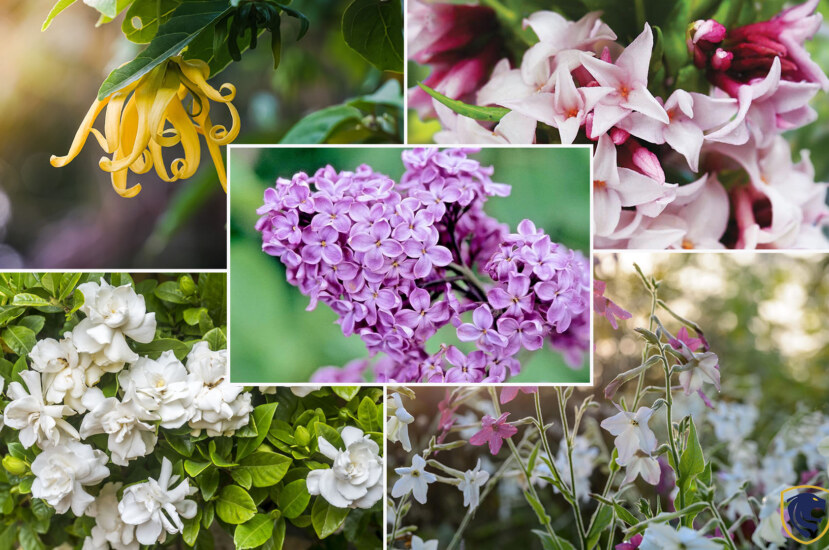Flowers have been used to extract fragrances since ancient times. Even today we have thousands of perfumes available which contain floral fragrances. Let’s explore the most scented flowers n the world which are also used to make perfumes. Long ago people used simple methods to extract scents from flowers. But now we have newer technology to get the most out of flowers, and it has been a multi-million dollar business.
Gardenia
According to historical records, men wore gardenia boutonnieres during the Gilded Era. Also, gardeners are known to enjoy a cup of sweet tea on porches as the aroma of gardenias wafts across southern yards. Try First Love for an early double variety with 4- to 5-inch flowers that last the entire growing season. This plant tolerates the milder environment of zone 7, as many gardenias struggle in temperatures outside of zones 8–11. If you’re short on room, you’ll like the mounding, compact gardenia called Buttons. The re-blooming beauty, which is only 2 feet tall and 3 feet broad, is a wonderful addition to grow in pots.

Most Scented Flowers In The World; Gardenia
jasmine
Jasmines usually have ascending branches that lack tendrils. Tubular, pinwheel-shaped clusters of white, yellow, or very rarely pink flowers are produced. The majority of evergreen or deciduous leaves contain two or more leaflets, while some species have simple leaves. The fruit is typically a two-lobed blackberry in most species.
To add distinctive flower aromas to cosmetics and toiletries, jasmine absolute is frequently used in perfumery. Jasmine is regarded as one of the most potent remedies for stress, anxiety, nervous tension, melancholy, and weariness in conventional holistic medicine and aromatherapy. Moreover, it has antiviral and antiseptic properties, as well as anti-inflammatory properties.

jasmine
India and Egypt are the two countries that mostly produce Jasminum grandiflorum material. They collectively control nearly 95% of the market. In 2014 an estimated 5.5 to 6 tons of material were produced in India. Egypt may have generated up to 4.5 tons in 2014. In Egypt, these numbers have decreased from 11 tons per year in the middle of the 1970s. However, Morocco and China are considered to be the further competitors for these countries.
Sweet Pea
Since being brought to England from southern Italy in the 17th century, sweet peas have been a common flower in English gardens. They have successfully transferred this flower to all corners of the globe.

Sweet Pea
While the initial sweet peas had tiny blossoms, their aroma was strong and alluring. It would appear that the color and fragrance of sweet pea blossoms, which naturally self-pollinate while in the bud, are there more for the gardener’s enjoyment than for the bees. A colorful hedge can be created in a flowerbed. Also, it can be grown in pots with shorter shrub or dwarf forms, such as ‘Supersnoop’ sorts. To cover fences and trellises, taller climbing cultivars like “Old Spice Mix” or “Royal Family” can be grown.
Daphne
Daphne impresses gardeners with lovely, dainty blossoms that scent the late winter or early spring garden before the lovely fragrances of summer flood the air.
Several daphne cultivars grow in pots for a divinely fragrant patio or porch. They are suitable to use in landscaping. White blossoms with a pink tinge and attractive foliage with yellow edges are features of the variegated Winter Daphne.

Daphne
Moreover, the everlasting Scent spreads over several months. Daphne produces abundant clusters of blush pink blooms that fill the yard with a lingering aroma. Container gardens and urban gardens benefit from the compact variation. ‘Gold Dust’ which is Daphne’s lovely golden speckled leaves brightens semi-shaded landscapes. Also, it bears scented pink spring blooms. Further, these flowers are simple and perfect for gardening in small spaces.
Ylang-Ylang
The Ylang ylang tree, which is indigenous to the South Pacific islands, produces intensely scented yellow blooms that only blossom at dusk. Ylang-ylang essential oil has been used for its relaxing, elevating qualities as well as its seductive, tranquil scent for ages.
Ylang-ylang trees grow in rainforest environments and require lots of sunlight to mature. The trees are covered with fragrant blossoms and have smooth, glossy green foliage. Moreover, the ylang-ylang takes 3–4 years to blossom after being produced from seed. While the tree is young, it will bloom twice a year. However, as it gets older, it will bloom virtually continuously.

“Ylang-Ylang”
Flowers of the ylang-ylang plant have a long life span and change color as they mature.
They first have a greenish-yellow color that mixes well with the tree and gradually changes to a vibrant, lemony yellow.
To draw the night-flying insects that pollinate them, ylang-ylang blooms emit their strongest smell at night. Flowers for ylang-ylang are harvested before daylight and immediately steam-distilled to preserve the scent at its best.
The ylang-ylang essential oil, which has a vibrant, flowery scent with overtones of fruit and spice, is well known for being a sensuous, relaxing aroma. It is also used as a flavoring for beverages, candies, and even ice cream.
Tube Rose
Tuberose is a fragrant lily, despite the name leading you to believe it is a sort of rose. Due to its intense white flowery aroma, it is frequently best recognized as a perfume component. With its beautiful star-shaped blossoms, tuberose makes a lovely addition to the garden or landscape in various regions.
Since the 17th century, when the flower was originally brought to Europe, the overpowering scent of the tuberose has been extracted for use in perfumery.

Tube Rose
Sillage de la Reine, also known as Parfum de Trianon and consists of tuberose, orange blossom, sandalwood, jasmine, iris, and cedar, was the perfume used by French Queen Marie Antoinette. Although though the essence is strong and can make the user feel nauseous, it is nevertheless a widely utilized flower note in perfumes.
Lilac
Only gardeners who lived in cooler climates could bring those wonderful memories back till later. Thankfully, breeders were sympathetic to southern gardeners and developed lilac varieties that thrive even in hotter regions. For instance, “Josee,” a diminutive, reblooming lilac with the broadest hardiness range that thrives in zones 3-9. Lilacs sometimes struggle with powdery mildew. But newer types have better disease resistance.

Lilac
Small gardens are the ideal place for the compact, mildew-resistant New Age Lavender Syringa. The hues of modern lilacs are also quite varied. There are red, pink, blue, yellow, cream, white, and even picotee. Try Bloomerang Dwarf Pink Lilac for a small, reblooming pink variety. It only expands to a height and width of 2 to 3 feet, blooms lavishly in the spring, and then continue to produce fragrant pink flowers.
Nicotiana
Because of its powerful, sweet scented, nicotiana is frequently referred to as jasmine tobacco. For a scent that will fill the evening air, choose a Nicotiana flower bed. Few of the shorter, more trendy Nicotiana alata have any fragrance at all. Normally. Further, nicotiana is grown as an annual crop.

Nicotiana




